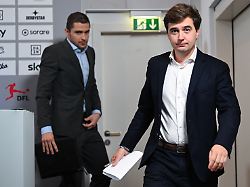TV contracts, marketing, 50+1
Merkel and Lenz are fighting for the future of the league for the DFL
October 9, 2023, 7:10 p.m
Only insiders in the football business still know Marc Lenz and Steffen Merkel. Both have been managing directors of the German Football League for exactly 100 days. They give insights into their work at a press conference. There is a huge mountain in front of them. They want and need him.
The new leadership duo of the German Football League used the first major appearance in front of the representatives of the 36 professional clubs to make a government statement. At the roughly two-hour general meeting in a Frankfurt airport hotel, DFL managing directors Marc Lenz and Steffen Merkel spoke about the most important tasks and challenges in the near future.
“It is important to maintain the attractiveness of the federal leagues and their strong social roots. The stable and rational economic management of the clubs must continue to be the basis in the future. And last but not least: German football must remain competitive in terms of sport and economics,” Lenz outlined the goals .
The central question is: How can the DFL create the best possible economic and organizational framework for professional football in an increasingly tough competition and rapidly changing market. “We are in a groundbreaking phase. The club representatives on the committees and we as management agree that further development of the DFL business model is necessary,” announced Merkel.
New TV contract is a huge task
Specifically, on the one hand, it is about increasing income from national media contracts from the 2025/26 season, the tender for which is planned for the second quarter of 2024. “We want to strengthen central marketing,” emphasized Merkel and promised: “We will offer an innovative, top media product at world level.” The clubs currently generate revenue of 1.1 billion euros per season and have recently suffered losses.
On the other hand, after the investor entry failed in the spring due to the veto of a majority of the clubs, new possibilities for an external source of income are being examined. “This should not be confused with restarting a partner process,” assured Lenz. However, it is undisputed that there is a need for investment to further develop the business model. They want to “talk openly” about this with the clubs.
When it comes to foreign marketing, there must also be a “clear aim to continue to grow,” emphasized Merkel. He compared the process to a “middle-distance run where we are on the right track.” In the current season, the DFL is generating over 200 million euros for the first time since the outbreak of the corona pandemic.
Clear commitment to 50+1
According to the two DFL managing directors, the conclusion of the cartel office proceedings on the 50+1 rule, which Lenz described as the “core of German football”, is also very important. “It ensures proximity to the fans and their participation. These are central fundamentals for us.” According to the 50+1 rule, investors in the DFL area cannot take a majority of votes in the corporations of clubs. The cartel office had called for an adjustment to the rule for the exceptional clubs Bayer Leverkusen, VfL Wolfsburg and TSG 1899 Hoffenheim.
The vote on a corresponding amendment from the DFL, originally planned for Monday, had to be postponed to December due to a bias request. “Finalizing the procedure is important in order to strengthen legal certainty,” said Lenz.
However, the new basic agreement between the DFL and the German Football Association was formally confirmed at the meeting. The agreement, which was decided at the end of June and has been in effect for six years since July 1st, regulates the financial flows between the DFL and the DFB. The decision is “an important and good sign for cooperation,” said Lenz. “It was and must again be a strength of German football that the DFB and the DFL work together positively,” he added.
The professional clubs had also recently given a torn picture when it came to important issues. However, Lenz is confident that the industry will appear more united again in the future. “I have the basic feeling that the clubs are aware of their responsibility for positive further development and that the league is approaching each other in order to find good, collaborative solutions to key issues.”
